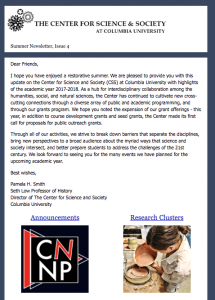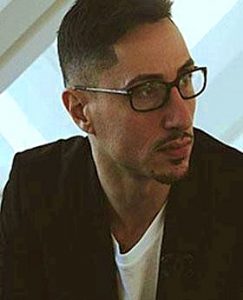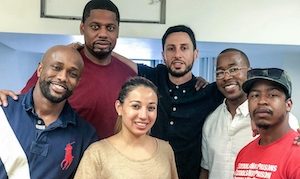2017-2018 has been a busy and successful academic year for the Center for Science and Society. This summer, we are producing a short newsletter series to celebrate and share all that we have accomplished! We hope you enjoyed our first issue on seed grants and our news article about Awardee Ben Mylius. Today, we are highlighting the work of the Research Cluster for Science and Subjectivity (RCSS), one of the research clusters that comprise the heart of the Center.
Below, RCCS undergraduate students Neci Whye (Columbia College ’18) and Ewoma Ogbaudu (Columbia College ’18) share their experience creating a course entitled Marginalization in Medicine: A Practical Understanding of the Implications of Race on Health.
The Course
This semester we were blessed with the opportunity to expand the Sunday Dinner Series into much more. While this has been in the works for the past year and a half, this semester we finally saw the Marginalization in Medicine course and the conference of the same name come to fruition.
The course focuses on the health issues that underrepresented communities face and creates a space to facilitate and encourage discussion on how to address them. Topics include drug policy and substance abuse politics; LGBT health in communities of color; and mental health and social stigma. Over the past year, we have developed the syllabus, gone through revisions, conducted research, coordinated with Harlem community organizations, and found faculty advisors. Marginalization in Medicine: A Practical Understanding of the Implications of Race on Health is currently taught by Dr. Rishi Goyal in the Medicine, Literature, and Society major of at the Institute for Comparative Literature and Society. Watching this course come to life has been one of the most fulfilling experiences I’ve had, and would not have been possible without the guidance and support of Dr. Pollack and the Center for Science and Society.
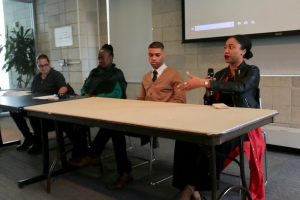
Community organization panel with participants from Harlem United, Harlem Arts Alliance, Gay Health Advocacy Project, and The Corner Project.
Our course is unique for several reasons. It follows in the footsteps of a previous course coming out of the Research Cluster for Science and Subjectivity: Life at the End of Life. We found it necessary that the course includes a service learning component, requiring students to go out into the community and volunteer so they can benefit from practical work while applying the concepts learned in class to benefit the Harlem community. This initiative has allowed us to partner with incredible community organizations such as the Harlem Family Institute, which aims to improve the mental health of black and brown kids; Hip-Hop Public Health, which teaches kids in Harlem about a number of health topics; and Holyrood Episcopal Church/Iglesia Santa Cruz which is a sanctuary church that provides support for those in immediate danger of deportation.
Our students are working to connect people of color in the Harlem community with health professionals and resources to improve their health in hopes of building the community’s trust in health professionals and in us as Columbia students. This aspect is particularly important to me considering the lack of trust communities of color have in the healthcare system. Black patients consistently receive insufficient and oftentimes negligent treatment in comparison to their white counterparts. Repeated histories of black exploitation and experimentation within the healthcare system are supported by common misconceptions that black people do not experience pain. While we discuss these issues in class, the volunteering component provides students the agency to practically engage with and address them within the greater Harlem community.
Additionally, this course is significant in that we as students were able to advocate for and fill a spot we thought was missing in our education. We started our work because we realized these conversations were not being had in the pre-medical and science curriculums. The feedback from other students has been overwhelmingly positive thus far and we look forward to finishing the semester strong!
The Conference
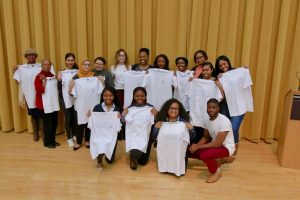
Conference attendees with the “Marginalization in Medicine” T-shirts after the networking mixer.
The Marginalization in Medicine Conference was an all-day conference that aimed to address the social determinants of health, facilitate engaging discussions as related to inequalities in the current healthcare system, and provide students with opportunities to establish relationships with medical school admission representatives. We also hoped to improve the opportunities for pre-medical students of color in fields where they are underrepresented. One of many ways to address these issues is through empowering students of color that are interested in becoming health professionals and increasing awareness on these topics. I believe that we were able to accomplish these goals through the conference.
We were fortunate to assemble an incredible group of people to speak for this event. Dr. Georges Benjamin, the Executive Director of the American Public Health Association, was our keynote speaker. Other guest speakers included Dr. Olajide Williams, the founder of Hip Hop Public Health, the Chief of Staff of Neurology, and the Director of Acute Services at Columbia University; Dr. Rishi Goyal, Assistant Professor of Medicine and head of the Medicine, Literature, and Society major at Columbia; Dr. Winfred Tovar, the founder of MIMSI International; and Dr. Tawandra Rowell-Cunsolo, Assistant Professor of Social Welfare Science at Columbia. Additionally, we had an overdose training workshop, medical students panel, community organization panel, dean’s admissions panel, and a panel featuring the Susan Smith McKinney Steward Medical Society.
These sessions offered student attendees diverse perspectives from various medical fields. Overall, the conference successfully met its goals, indicated by the overwhelmingly positive reviews received. 80% of students who attended and filled out the post-conference survey said they had not previously attended a conference of this nature that addressed these topics. All participants who filled out the survey found the conference necessary. We have included some quotes from attendees below:
“I really enjoyed the Overdose Intervention Training, I thought it was nice that it was more interactive than a traditional panel but just as informative even beyond the technical details we learned.”
“It was very useful and inspiring for me, being a woman and a minority. I was inspired to continue along my journey towards medicine and to look at the field from a public health perspective.”
“I took a lot away from it, I hope to work with marginalized communities and the conference showed me ways to do that. For example, with Dr. Williams I saw how he was able to blend two passions of his together to positively impact his community. Also, the conference allowed for moments of self- reflection and to learn how the institutions around us also contribute to these disparities in medicine.”
We would like to take this time to thank everyone who made these two incredible projects come to life. It would not have been possible without Dr. Pollack, Dr. Goyal, Dr. Aiken, the Research Cluster for Science and Subjectivity, and the Center for Science and Society. We are eternally grateful to you all for allowing us to realize our dreams.
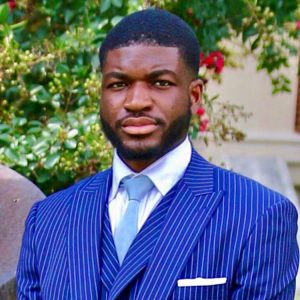
Ewoma Ogbaudu is a graduating senior studying Columbia College studying biology. With Neci, he has addressed marginalization in medicine through creating a class, hosting a dinner series, and a student seminar. Ewoma plans to attend medical school and pursue a master’s in public health.
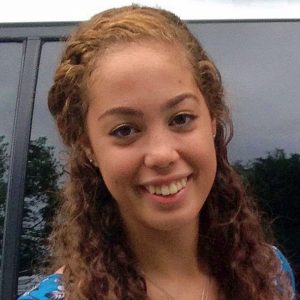
Neci Whye is a graduating senior in Columbia College studying biology and art history. She is passionate about addressing healthcare disparities especially those facing the black community. She aspires to work in marginalized communities as an emergency medicine physician.
Interested in supporting our research clusters? Visit our donation page or feel free to contact us.
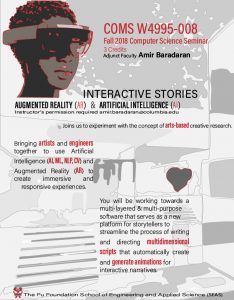 COMS W4995-008 Interactive Stories with AR/AI, taught by Amir Baradaran is open to undergraduate and graduate students across the university.
COMS W4995-008 Interactive Stories with AR/AI, taught by Amir Baradaran is open to undergraduate and graduate students across the university.
